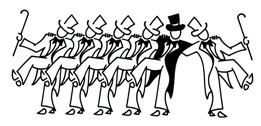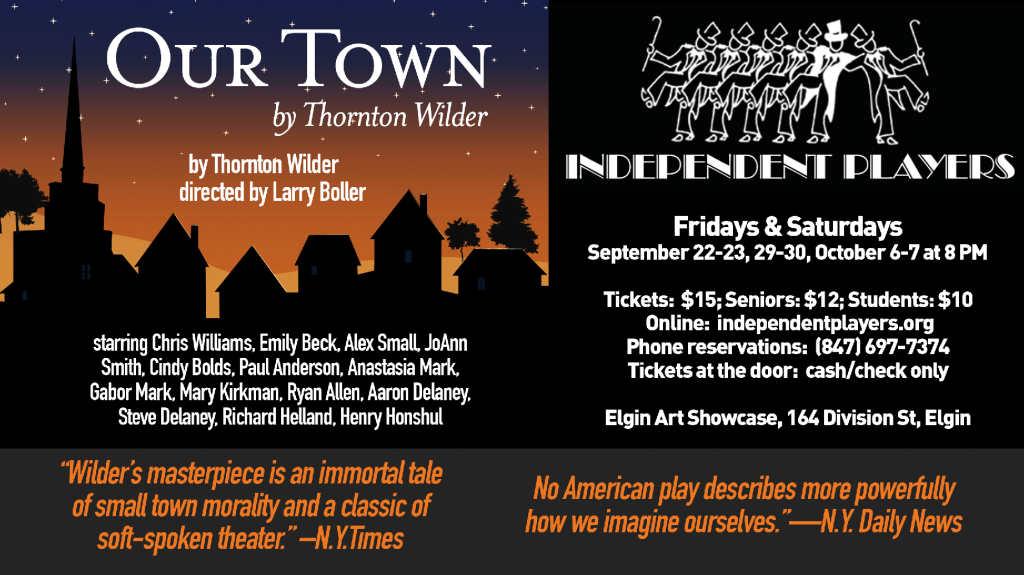With the 2017-2018 Season, INDEPENDENT PLAYERS celebrates 40 years of producing theatre in Elgin and to celebrate this landmark, it is at work putting together what it hopes will be one of its most memorable seasons ever. Because IP has led the way producing countless classic plays (in addition to numerous contemporary plays and musicals it has also produced) over four decades, it opens this celebratory season with the quintessential American masterpiece Our Town by the incomparable Thornton Wilder. It runs Fridays and Saturdays, September 22-October 7, 2017 at 8 PM at the Elgin Art Showcase, 164 Division Street, Elgin.
Essentially, Our Town tells the story of the fictional American town of Grover’s Corners, New Hampshire, between 1901 and 1913 through the everyday lives of its citizens. It is an “allegorical” world which represents the universality of human existence. Setting the play in the theatre in which it is being performed, Wilder uses various “metatheatrical” devices. The play is performed without a set on a mostly bare stage. The Stage Manager of the theatre addresses the audience directly, brings in guest lecturers, fields questions from the audience, prompts actors, cues scene changes, Transports the audience back and forth in time to relay the story and fills in playing some of the roles. With a few exceptions, the actors mime actions without the use of props. The actors are clearly aware of the fact that they are only acting, not being the characters.
The play begins as the Stage Manager introduces the audience to the town of Grover’s Corners. He then invites Professor Willard to speak to the audience about the history of the town. Various other citizens go about their daily routines while the Webb and Gibbs households send their children (Emily and George respectively) off to school.
In Act 2, three years have passed and George and Emily prepare to wed. The day is filled with stress; then the Stage Manager interrupts the scene and takes the audience back a year to the soda shop where Emily and George discuss the future and their love for each other. George resolves not to go to college, but to work on and eventually take over his uncle’s farm. Back in the present, George and Emily say they are not ready to wed, but calm down and happily go through with the wedding.
In Act 3, nine years have passed. The Stage Manager opens with a monologue emphasizing eternity and bringing our attention to the town cemetery, the characters who have died since the wedding and Sam Craig who has returned to Grover’s Corners for his cousin’s funeral. That cousin is Emily, who died giving birth to her and George’s second child. After the funeral, Emily joins the dead; they urge her to forget her life, but she refuses. She returns to Earth to relive her twelfth birthday, but the memory proves too painful and she realizes that every moment of life should be treasured. When she asks the Stage Manager if anyone truly understands the value of life while they live it, he responds, “No. The saints and poets, maybe—they do some.” Emily returns to the dead as George kneels weeping at her grave.
“This brilliant American play, which received the Pulitzer Prize for Drama in 1938, is generally considered by critics to be a microcosm of the life cycle,” says Don Haefliger, IP Artistic Director. Reviewing the play’s premiere in the N.Y. Times, Brooks Atkinson says “Our Town is one of the finest achievements of the current stage…a hauntingly beautiful play.” In his book “Our Town”: An American Play, Donald Hoberman writes “Wilder is reminding the audience how precious daily life is because it determines our true reality, …our enduring identity is not derived from the things and the events [of the play] because they are familiar and repeated but from our ever-new, ever-fresh relationship to them.”
“While some audience members did not find the visual simplicity of the set compelling, Wilder’s purpose in using a bare stage was, in part, to set the audience free from the meaningless particularity of the box set [which was pretty much standard fare] when Our Town was first produced.” Haefliger said. “It was praised by Rex Burbank for its simplicity and tragic vision, but most productions which are done are overly sentimental and romanticized thus undermining Wilder’s philosophical themes and Burbank’s tragic vision reading.” He continues: “[In 1956], my professor and mentor, Arthur Ballet nominated Our Town as the Great American Drama. In a theatre history lecture, he pointed out the Stage Manager’s likeness to a Greek chorus as well as death acting as the ‘fear-agent’ employed as ‘catharsis.’ Another prominent commentator of that time, George Stephens, denied the play its tragic status and labeled it as ‘gentle nostalgia or, to put it another way, sentimental romanticism.’ As if anticipating Stephens’ objection, Ballet concluded his argument with his own definition of tragedy: ‘Tragedy, in its finest sense … should point the way to a higher level of understanding of man as a creature revolving in the cosmos. In the Aristotelian vein, perhaps the most tragic event in Out Town is George collapsing in front of Emily’s headstone, signifying the most universal lament of them all: that we, our loved ones, every living thing dies.’
Haefliger continues: “Another of my favorite mentors and theatre commentators, Robert Corrigan, in The Modern Theatre, says ‘These aspects of daily life, are universal to all generations and cultures. The play’s emphasis on the universality of daily life, conscious audience engagement and minimalist theatrical style are a few of the signature techniques which have qualified Wilder’s work both at home and abroad as the ‘most representative and significant product of the modern American theatre.’ It is amazing what one can find amongst his notes from grad school!
One of IP’s resident directors, Larry Boller, who most recently directed its production of Eleemosynary, directs the excellent cast which consists of Ryan Allen, Paul Anderson, Emily Beck, Cindy Bolds, Aaron Delaney, Steve Delaney, Richard Helland, Henry Honshul, Mary Kirkman, Anastasia Mark, Gabor Mark, Alex Small, JoAnn Smith and Christopher Williams. Several of these actors (Kirkman, Smith and Williams) have graced the IP stage in previous productions and will, once again, share their talents with all of us. We also wish to extend a warm and hearty welcome to all those in the cast who will be making their IP acting debuts in this very special production.
This production of Our Town opens Friday, September 22 and plays Fridays and Saturdays, September 23, 29-30 and October 607, 2017 at 8 PM at the Eglin Art Showcase, 164 Division Street, Elgin. Tickets are $15, with a discount for Seniors (65 and older) at $12 and Students (ages 14-21) at $10. Tickets can be purchased here on the website (credit card only) and at the door prior to each performance (cash/check only). For further information or reservations, call 847-697-7374. Come and join us for the first major production of our 40th Season in Elgin!


